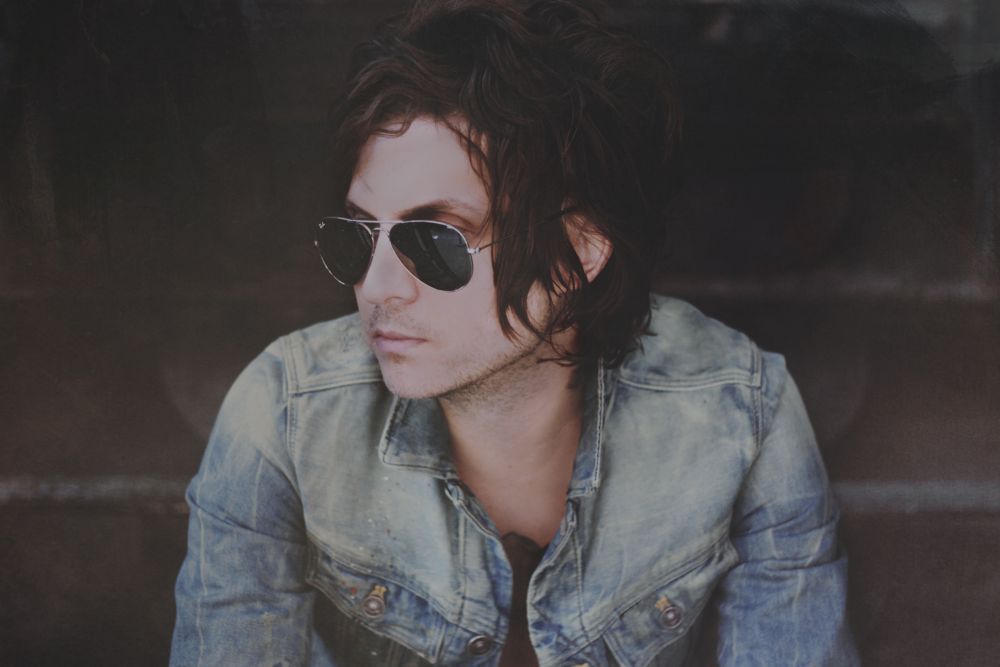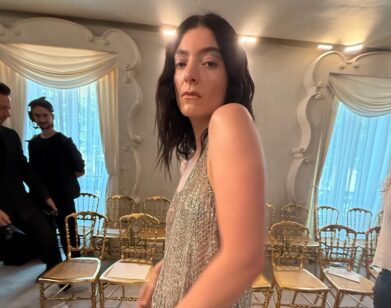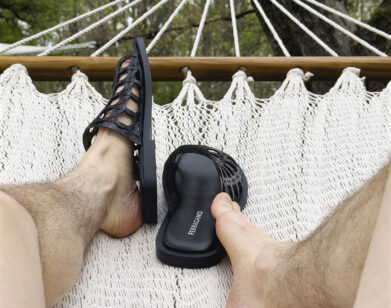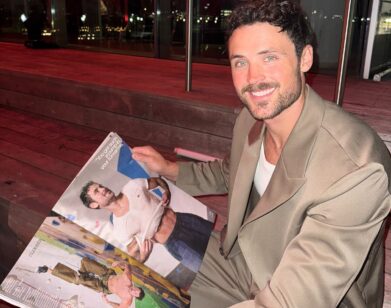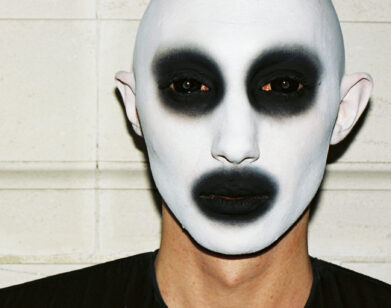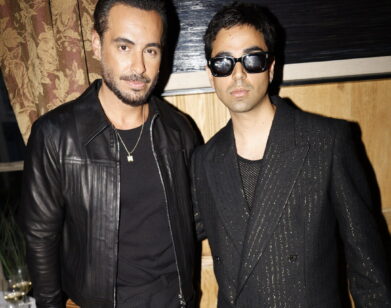Christian Benner, the Rebel in Leather
A little over a year ago, Christian Benner walked into the iconic punk-rock thrift store Trash and Vaudeville on St. Marks looking for something real to hold onto. It was a welcome reprieve for Benner, who had spent a decade working as a window dresser for Abercrombie & Fitch and Victoria’s Secret.
Benner sites the establishment’s punk sage-in-residence, the eternal “runaway boy” Jimmy Webb, as the catalyst for launching his career as a designer. Benner introduced himself to Webb and explained that he had recently chosen to be sober after years of excess and abusive partying, much like the seasoned shopkeeper. Webb responded with a long hug and Benner left with an old Kinks t-shirt he’d purchased for 20 dollars. “It was a thick, ugly, graphic band shirt, something I normally would never wear. I don’t know why, but I decided to cut the sleeves off, pour bleach on it, and bury it in my backyard for a month,” he says.
After unearthing (and washing) the shirt, Benner wore it to work the next day at the vintage boutique What Goes Around Comes Around. “Once it was clean, it felt amazing. Everybody asked me where I got it. So I told them. The next thing I know, the owners were asking me to make more.” Benner started by transforming five, decrepit v-neck t-shirts he had been wearing under his black Victoria’s Secret button-downs for years. Kristen Wiig bought one a week later. “Suddenly I was given a bag of 50 shirts. I thought, how do I recreate this?” he recalls. “I was the Jackson Pollock of bleach and paint remover. I’d line them up, hammer the shirts, throw bricks and rocks at them, and then wash them. Sometimes I’ll even throw rocks in the dryer.”
Soon after, the designer began to see his creations in magazines like Italian Vogue. Donatella Versace purchased What Goes Around Comes Around’s entire inventory of custom Christian Benner pieces. Benner was quickly outgrowing the confines of the establishment and was let go in December of 2013. “I actually called my mom,” he admits. “I was pretty down. My girlfriend just broke up with me. My mom told me that I’m on my own. Instead of being afraid of that notion, I embraced it.” Benner used his last paycheck to finance his new business and relied almost entirely on social media to promote it.
This evening, Benner’s friend and roommate, the model, surfer, and philanthropist Luke Ditella, will host a pop-up fashion show at The Griffin NYC. We caught up with Benner in the backyard of his East Village apartment, which he shares with Ditella and his fiancé, photographer Melissa Dilger, just a few feet away from where he buried that first Kinks t-shirt not so long ago.
KURT MCVEY: It’s clear where you’re drawing most of your inspiration from, but what bands were you listening to when you were growing up?
CHRISTIAN BENNER: There’s two sides of it. That ’90s hip-hop was so cool, like the Wu-Tang Clan, but on the other side, I was a rock-‘n’-roll kid. I played in a punk rock band.
MCVEY: What was the name of the band?
BENNER: Mother Mania. [laughs] We were 15. We’d play at roller skating rinks and spit on people as they rolled by, then drink beer in the parking lot and that was it. We thought we were so cool. There was a station growing up, 106.3 FM, I doubt it exists anymore. It was a local grunge-alternative station. It was about discovering things. That’s actually how I discovered Jimmy Gnecco’s band Ours. That’s what radios did then—you discovered a band and then you went out and bought the album. I’ve been on a ’90s grunge kick lately on Pandora, especially while I work.
MCVEY: What’s been showing up?
BENNER: A lot of Alice in Chains.
MCVEY: They don’t get the love they deserve. Their unplugged is drastically overlooked.
BENNER: Well, of course, Nirvana is a given.
MCVEY: You mentioned to me earlier that some bands have reached out to you to say, “Thanks for keeping this fresh” but have you ever had any negative feedback?
BENNER: Not really. To me, nostalgia brings people together. When I was growing up, my parents would hear a song on the radio and go, “I can’t believe this is classic rock now.” Bands like Led Zeppelin, Black Sabbath, and now I’m getting older and I find myself saying the same thing.
MCVEY: Pearl Jam is showing up on classic rock stations.
BENNER: There’s nothing wrong with it. It’s ok to be punk rock about it, but really, what brings people together like music? Nothing.
MCVEY: Is there a newer band out there that you’re into that you could confidently call a “rock band?”
BENNER: It is a tough question. Somebody just handed me a Tame Impala record. [They are] very much like Pink Floyd, in that they really seem to experiment with their gear and whatever’s around them. They can jam hard, but they’re also so experimental.
MCVEY: Tell me about your first leather jacket.
BENNER: I still peruse all the old thrift stores on St. Marks, but it was years ago that I really fell in love with these old, handmade leather jackets. To me, they were works of art. I would try them on religiously. I loved the feel, the weight, and I loved the way they instantly made me feel different. It felt like putting on a superhero cape. Some were really expensive, but after some hunting, I found a great one for $40 and just hung it on my wall.
MCVEY: Eventually, you started to paint these jackets. Do you look at them like canvases?
BENNER: Definitely, and I never plan what I’m going to do.
MCVEY: You mentioned that Pollock is an inspiration.
BENNER: There were no rules with what he did. No one told him what to do. That’s what art should be. I went to art school and there’s only so much they can teach you.
MCVEY: What kind of paint do you use?
BENNER: Straight-up house paint. It doesn’t go anywhere on your wall, why would it come off your jacket?
MCVEY: Part of being a “punk” is calling out “posers,” right? [laughs] You’re obviously becoming rather well known, and you’re still in a place where you can almost curate who’s wearing your stuff and where. Are you nervous about protecting your brand, or can anyone wear your stuff?
BENNER: I’m not going to change my aesthetic or who I am. I’m going to produce what I produce.
MCVEY: You got some flack for the 5 Seconds of Summer kids wearing your stuff.
BENNER: A little. It’ll blow over. [laughs]
MCVEY: I saw them in your stuff on the red carpet at the VMAs and some interviewer asked one of the kids, “What are you wearing?” The kid goes, “Clothes.”
BENNER: [laughs] Yeah, I saw that.
MCVEY: It’s not the first time someone’s replied with that, but at least he was trying to be punk about it.
BENNER: You can’t create for one person. It’s selfish. As long as you’re true to yourself, your stuff can be for everybody. If someone wants to feel that peace and that freedom, go for it. It’s about living your dream. That being said, I like when someone tells me, “I’ve been saving up to buy one of your jackets, and I love it.” If it’s too accessible, if it’s manufactured at a lower level, then it’s not special anymore.
MCVEY: Cobain talked about saving up to buy an expensive vintage sweater before he became rich, and how it had this sentimental value, and that once he had money, that feeling could never be achieved again.
BENNER: A little depressing. I think about that every day.
MCVEY: Can you manufacture “cool?”
BENNER: Absolutely not. Though I’ve had young business guys who wear suits every day call me and say, “Please help me look cool when I go out at night.” [laughs] I actually became friends with one guy. I really got to know what his likes and dislikes are. He just needed help getting out of his shell. I’m glad I wasn’t too “cool” for him, because he’s a great guy and really helped me visualize the more ready-to-wear stuff.
MCVEY: What’s it like being compared to Varvatos?
BENNER: It’s flattering. I really look up to him. People were so upset when CBGB’s closed, but look what he’s done with the space. He still shows love and pays tribute to all those great musicians—whether it’s using them in his campaigns or performing in the space.
MCVEY: Where do you think you’ll be in ten years?
BENNER: My biggest fear in life is the future. I always think, “Is this going to be relevant tomorrow?” I’m starting to hear people say, “That’s very Christian Benner.” [both laugh] You find yourself becoming a brand, and once that happens, you have to look out for it.
MCVEY: Who’s the one person you’d like to see in one of your jackets who hasn’t donned one yet?
BENNER: Lenny Kravitz for so many reasons. The guy just screams cool.
FOR MORE ON CHRISTIAN BENNER, VISIT HIS WEBSITE.

